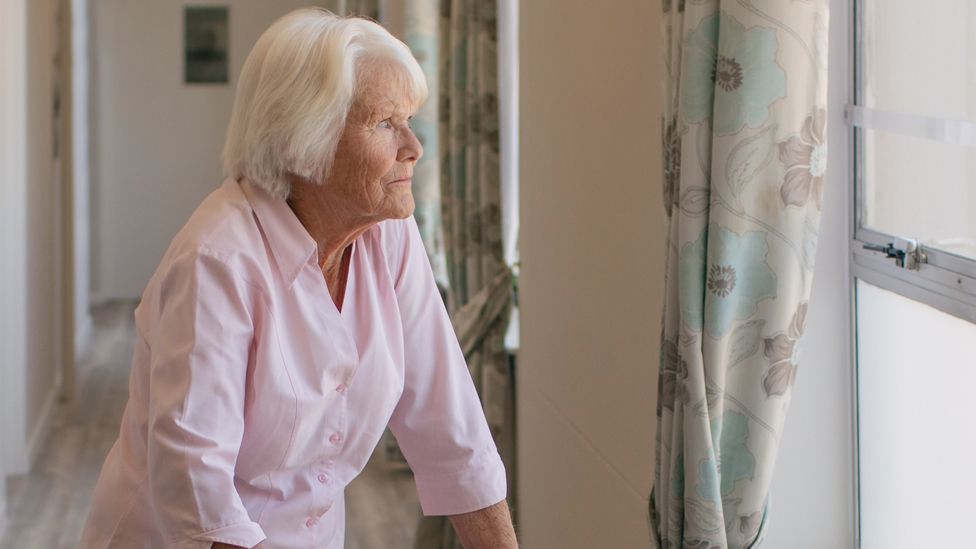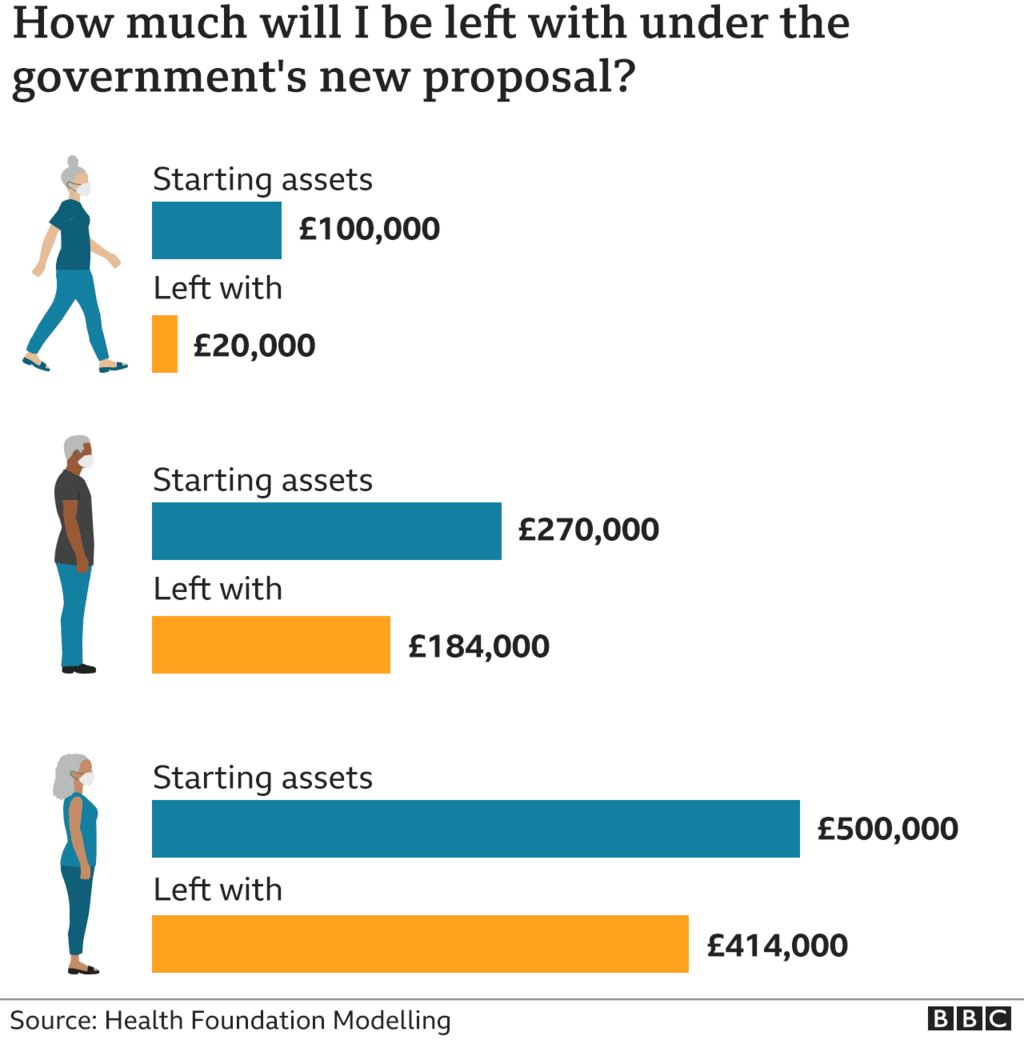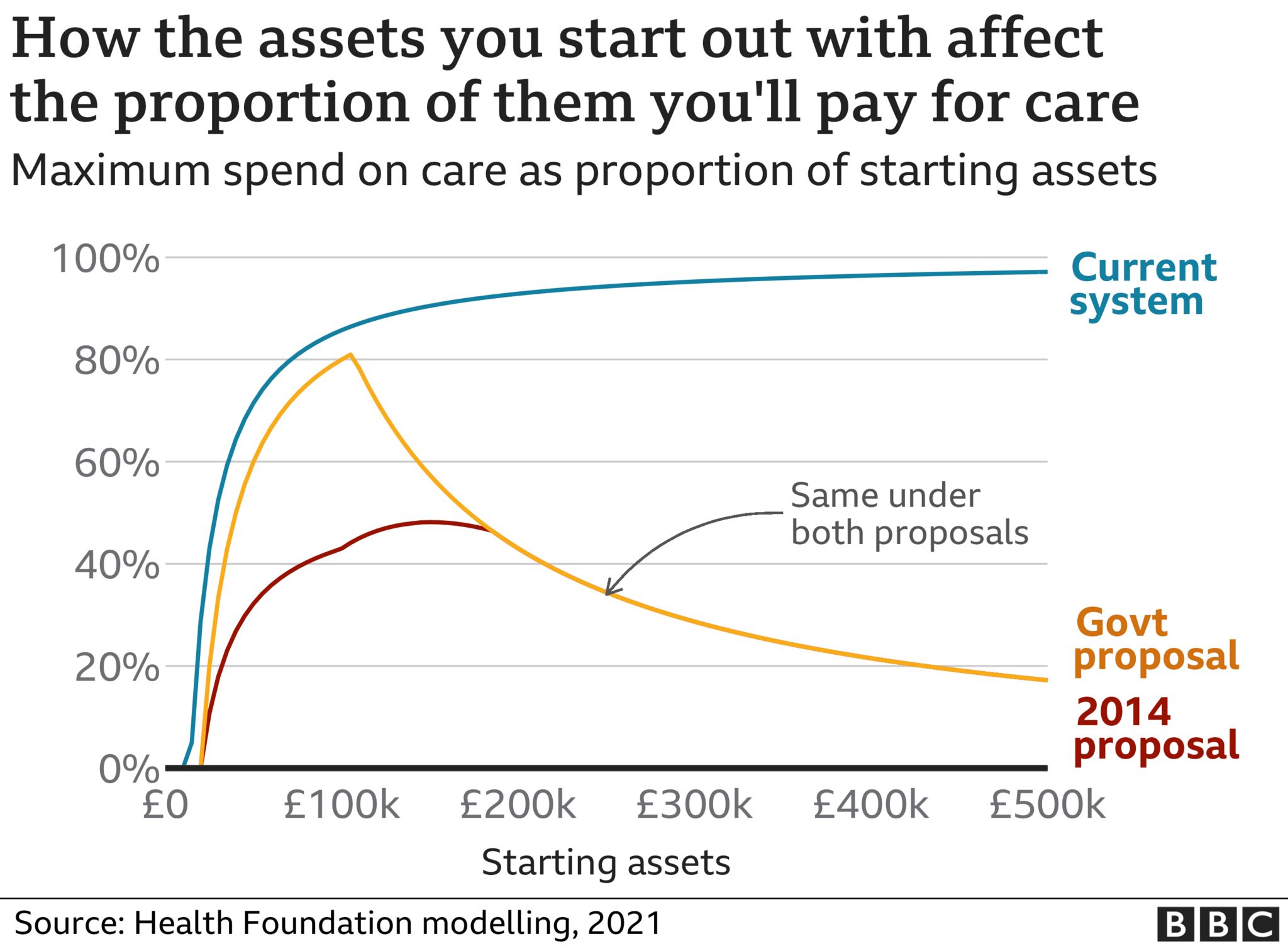
Boris Johnson has insisted his plan for social care will help tackle a "long standing social injustice" over cost.
The government unveiled its suite of proposals in September, including an £86,000 cap on personal care costs.
But an amendment to the plan, published last week, said support payments from councils will not count towards the cap, with charities warning the move would unfairly hit the poorest.
The prime minister insisted the new system would be "incredibly generous".
Speaking at a CBI conference, the prime minister said: "We are finally tackling a problem that has bedevilled this country for many, many years."
But Labour's shadow health secretary, Jonathan Ashworth, called it "daylight robbery", telling BBC Breakfast that people with fewer assets - especially in the north of the country - would end up losing a larger proportion of their wealth than better off people.
MPs will debate the new details of the plan in the Commons later.
But while it is expected to get enough support to move to the next stage in Parliament, BBC political editor Laura Kuenssberg said there was "irritation" from Tory MPs about the move, as well as from the opposition benches.
The cap on personal care costs is a central element of the government's plans to change how adult social care in England is funded.
From October 2023, the idea is that no one will pay more than £86,000 over their lifetime for personal care, such as washing, dressing and eating.
Once people have reached this cap, ongoing costs for personal care will be paid for by local authorities.
Money spent on living costs - such as food, energy bills and accommodation - would not count towards the limit.
The threshold for getting some council support to pay for costs will also be made more generous, with people with assets up to £100,000 able to qualify, rather than £23,250 currently.
The government did not specify in September whether people receiving these payments would be able to put them towards reaching the cap.
But on Wednesday, it published guidance confirming that only payments people make out of their own pocket will count.

Questioned about the move, Mr Johnson said the new system was "progressive" and "much better" than the existing one.
"Under the existing system nobody gets any support if they have assets of £23,00 or more - now you get support if you have £100,000 or less, so we're helping people," he said.
"It helps people not just in residential care, but also people who benefit from domiciliary care as well.
"We're finally tackling a problem that has bedevilled this country for decades, and been very very unfair on people who've got dementia or Alzheimer's and been forced to face catastrophic, ruinous costs for that care, when someone who has cancer or some other affliction does not."
He added: "We're addressing a long-standing social injustice and it will benefit the people of this country."
But when the move was announced last week, it was condemned by a number of charities, saying it would offer "little protection" to those with fewer assets, as it will make the cap harder to reach.
And it also goes against recommendations by economist Sir Andrew Dilnot, who set out the blueprint for the cap back in 2011.
Those proposals were put into law in the 2014 Care Act, but were never implemented. MPs' vote on Monday night will amend that law.
Speaking to BBC Radio 4's Today programme, Sir Andrew said the wider package of reforms to social care was "a significant step forward", and the government "deserves credit [as] governments for decades have ducked this altogether".
But he said the move would not stop the less well-off facing "catastrophic costs", as the government had pledged.
He added: "Less well off people still would, if this amendment is passed, face a real catastrophe if they were one of the minority who face really big care costs... so I think this does leave a significant hole in the overall proposal."


"There may not be a roar of disapproval, but there will be continued rumblings on the backbenches."
That's how one former minister predicted how Monday's vote on social care will go - a government victory, but continued pressure possibly forcing a U-turn further down the line.
There has been uneasiness about the proposed level of the social care cap in England. At £86,000 it disproportionately hits those with lower-value homes.
To some Conservative MPs who snatched their seats from Labour, that doesn't look like levelling up.
Discontent grew with the announcement that some less affluent people would have to wait longer than expected to reach the £86,000 limit.
Privately some Conservatives blame the Treasury - and say Boris Johnson's backbone needs stiffening.
And there are worries that Labour's narrative of "broken promises" is beginning to take hold.
Potentially as damaging is the perception that the government is over-promising and under-delivering - allowing an improvement in the social care system to be seen as inadequate.
With tax rises on the way before next spring's local elections, some of Boris Johnson's MPs fear a gathering political storm.

Labour has attacked the proposal and promised to vote against it when it comes to the Commons on Monday evening.
Mr Ashworth told the BBC: "They don't protect everybody from catastrophic costs. It is actually a care con because if you need social care and you are fortunate enough to earn a £1m house, say in the home counties, then 90% of your assets will be protected.
"But if you are unfortunate enough to need social care and you live in a £80,000 house in say Barrow or Hartlepool or Mansfield, you'll lose nearly everything.
"That is manifestly unfair. That is not levelling up, it is frankly daylight robbery."
New tax
The government has estimated by not including care covered by councils, it will save £900m on Sir Andrew's plan.
Sir Andrew said: "That needs to be compared to the much more than £10bn a year the health and social care levy is going to raise.
"Of course we have to be careful of how we spend money, but these are small amounts of money compared to overall public spending and very small amounts of money compared to what is being raised to pay for health and social care."


How will the social care cap work?
- every adult receiving care will have an account measuring how much they spend on care fees from their own income or assets
- those with total assets worth more than £100,000 will have to pay all of their care fees themselves
- once assets fall below £100,000, people will be able to claim means-tested payments from their council to help with costs
- if they cannot pay for care from their income, they will have to contribute £1 for every £250 they have in assets
- care home fees - such as food and rent - will not count towards the £86,000 limit, but will be capped at £200 a week
- people with assets under £20,000 won't have to contribute to their care costs, although they might have to contribute from their income.


How will you be affected by the cap on social care costs? Email: haveyoursay@bbc.co.uk.
Please include a contact number if you are willing to speak to a BBC journalist. You can also get in touch in the following ways:
- WhatsApp: +44 7756 165803
- Tweet: @BBC_HaveYourSay
- Upload pictures or video
- Please read our terms & conditions and privacy policy
If you are reading this page and can't see the form you will need to visit the mobile version of the BBC website to submit your question or comment or you can email us at HaveYourSay@bbc.co.uk. Please include your name, age and location with any submission.
"social" - Google News
November 22, 2021 at 06:41PM
https://ift.tt/3HIkd7p
Social care: Boris Johnson defends his plan amid criticism over the cost cap - BBC News
"social" - Google News
https://ift.tt/38fmaXp
https://ift.tt/2WhuDnP
Bagikan Berita Ini














0 Response to "Social care: Boris Johnson defends his plan amid criticism over the cost cap - BBC News"
Post a Comment